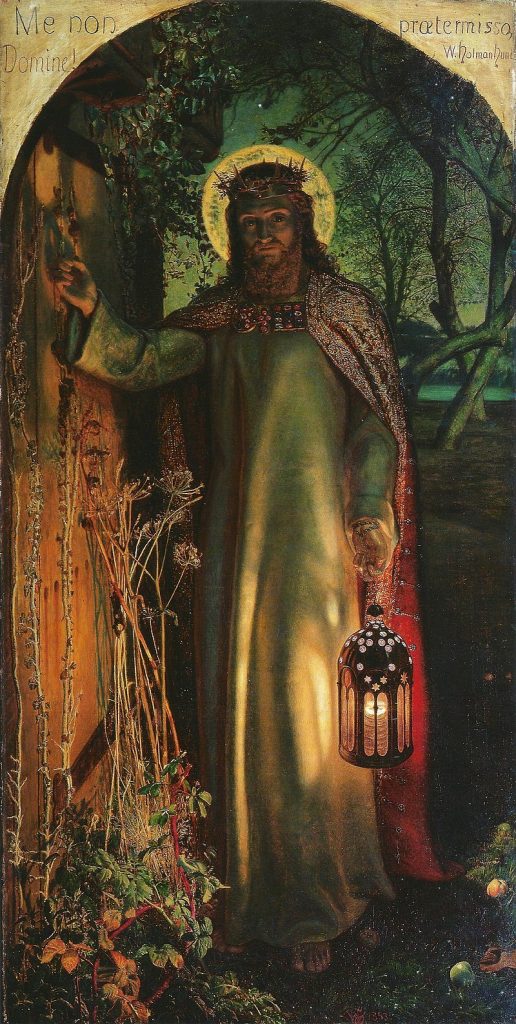Remember, a man of understanding never thinks, he simply looks at the fact. The very look reveals. A man of non-understanding thinks. It is just like a blind man who wants to go out of this house: before he leaves the house, he will have to think, “Where is the door, where is the staircase, where is the gate?” But a man with eyes, if he wants to go out, simply goes out. He never thinks, ”Where is the door, where is the staircase, where is the gate?” Because he can look, there is no need to think.
If you are blind, then there is much need to think. Thinking is a substitute; it hides your blindness. A man who can see directly never thinks: Jesus is not a thinker, Aristotle is a thinker, Buddha is not a thinker, Hegel is a thinker. A man who is enlightened never thinks, he simply looks, he has the eyes to look. And the very look reveals where the way is, where the door is, where the gate is, and then he goes.
When Jesus is there the gate is open. But you are blind: there is every possibility that you will ask Jesus himself, ”Where is the door? Where is the gate? Where should I go?”
There is a famous painting by William Holman Hunt (1827–1910). When it was exhibited in London for the first time, critics raised a question. The painting is of Jesus, one of the most beautiful: Jesus is standing at a door.
The door is closed and it seems that it has remained closed forever and forever, because weeds have grown near it; nobody has opened it, it seems, for centuries. It looks very ancient, tattered, and Jesus is standing at the door, and the painting is entitled ”Behold, I stand at the door and knock!” There is a knocker on the door, and Jesus has that knocker in his hand.
The painting is beautiful. But critics always look for some mistake; their whole mind moves to where something is lacking. They did find one mistake: a knocker is there on the door, but there is no handle. So they told Hunt, ”The door is okay, Jesus is okay, but one thing you have missed: there is no handle on the door.”
Hunt laughed and said, ”This door opens inwards” – Jesus is standing at the door of man, his heart. It cannot open outwards, so there is no need for a handle, there is only a knocker. It opens inwards, the door of the heart.“
Jesus comes and knocks at your door… but you start thinking. You don’t open the door; rather, you may even get scared and bolt it more: ”Who knows what type of man is standing outside? Looks like a tramp! And who knows what he is going to do once you open the door?” Once you open the heart you become vulnerable; then you are not so secure and safe. And this man looks an absolute stranger. You cannot trust. That’s why when Jesus comes to the door you miss.
There have been thinkers like Immanuel Kant, Schiller, Hegel, who say: If there is no God, He has to be invented, because without God man will lose all significance. And they are also right: even if there is no God he has to be invented, for man’s sake. It is better to have an invented God than not to have any. At least He will give an appearance of significance to life, a certain rhythm. The noise will start looking at least like music. The accidental will not be accidental anymore, some meaning will arise. Hence, they say if there is no God, He has to be invented.
And on the other pole, Jean-Paul Sartre, Friedrich Nietzsche, Sigmund Freud say: Even if there is God, He has to be killed, because if He remains, man is reduced into an object. Man loses all freedom; man loses all will. But both are wrong, because both are thinking in terms of God as if God is ‘the other’.
Kabir says – just as all the mystics of all the ages have been saying – God is not the other. He is you. He is your inside. He is your subjectivity, so how can He reduce you into an object? He is not separate, so how can He take your freedom away? He need not be invented because He is already there. And He need not be killed, because in killing Him you will be simply committing suicide – and that is impossible; nobody can commit suicide. You can drop one body; you will immediately enter into another womb. Suicide is impossible. You can pretend the game of committing suicide but you can never succeed in it, because nothing can be destroyed. Not even a grain of sand can be destroyed.
Physicists say there is no possibility of destroying anything. Neither can something new be created nor can something existent be destroyed. If this is so even about a grain of sand, what to say about the being of man?’ – that is the highest flowering – how can it be destroyed? Life is eternal. Life is immortal. It changes forms, certainly, just like the waves in the ocean go on changing but the ocean remains. Bodies come and go, minds come and go, but your innermost witness remains always there. And that witness is God. Hegel, Kant, Schiller, are wrong; so is Freud, so is Nietzsche, so is Jean-Paul Sartre. They both accept the same premise: that God is the other. And God is not the other.
God is your very soul. God is already in you… just a little alertness. Wake up and see! You need not wait for the Guest. The Guest has already arrived in the very being of the host. The Guest is found in the host.
THE GUEST IS INSIDE YOU -says Kabir- AND ALSO INSIDE ME; YOU KNOW THE SPROUT IS HIDDEN INSIDE THE SEED. Exactly like that – just as in the seed the sprout is hidden – in you is hidden God. Of course if you cut the seed, if you dissect the seed, you will not find the sprout – or will you? You can cut the seed; you will not find anything at all: no sprout, no foliage, no branches, no flowers, no fruits, nothing at all, because the seed is the unmanifest. It needs growth, it needs a right soil, it needs a gardener.

It needs great art to help the unmanifest to become manifest; to bring that which is hidden to the world, great skill is needed. Buddha has called religion nothing but skill, art, UPAYA, a methodology – a methodology to bring the unseen into the world of the seen, to bring the invisible into the world of the visible. In the seed the flowers are there, but they are invisible. A proper context will be needed where they can become visible.
Exactly in the same way, God is in you; you are the seed of God. God is not to be worshipped but revealed. You have to grow and become a God! You are not to seek and search for a God somewhere, already ready-made. You have to grow; growth is religion. You have to grow into a God. You are carrying the seed; you have to find a soil – you have to find a Buddha-field. You have to find a gardener, a Master.
You have to find a commune where many trees are blooming, so that hope can arise in the heart of the seed that “Yes, if other seeds can become trees, GREAT trees, why can’t I?”; so that longing can arise in the heart, so the heart becomes aflame, afire, athirst. In that very thirst, in that very longing, the seed has started moving towards the flowers.
You meet God outside; you meet God inside. You move between the outer God and the inner God: that movement is real richness. Wherever you go you find God. You open your eyes and the tree is there, and God is green in it and God is gold in it and God is red in it. And you close your eyes: the pure consciousness, the silence – and God is silence there.
God is in you and in the other. Life becomes multi-dimensional. It is a long journey, but an inner journey. You can make the whole journey by sitting silently, not going anywhere, because the going has to be something inner. It is not in space; it is in consciousness.
Osho: The Mustard Seed: My Most Loved Gospel on Jesus: CH 20. MIND IS DRUNK (Excerpts)
Osho: The Guest: Ch #13: Chapter title: The guest is inside you (Excerpts)
Wishing you and your loved ones Merry Christmas and A Divine and Happy New Year 2024. May God grace your life with His generosity and blessings!
मुझ को ख़्वाहिश ही ढूँडने की न थी
मुझ में खोया रहा ख़ुदा मेरा ………………….जौन एलिया
mujh ko ḳhvāhish hī DhūñDne kī na thī
mujh meñ khoyā rahā ḳhudā merā …………..JAUN ELIYA
I had no desire to search for Him,
My God remained hidden within me…
…and we keep thinking and complaining that we just couldn’t find Him. This absolutely wonderful song by Abida Parveen and Atif Aslam just highlights that feeling. Composed by Abida Parveen. It’s written by Hazrat Bedam Shah Warsi and the Persian Couplet by Hazrat Usman Harooni.
Pardadari – Abida Parveen – Atif Aslam | Official Video | BazmeRang Chapter 1 (youtube.com)
Lyrics:
MUJH MAIN AB RANG SUB TUMHARA HAI
ITNA KEH DAY KE TU HAMARA HAI…
YEH ACHHI PARDADARI HAI YEH ACHHI RAAZDARI HAI
JO AAE TUMHARI BAZM MAIN DEEWANA HO JAAE
YAHAN HONA NA HONA HAI, NA HONA AIN HONA HAI
JISAY HONA HO KUCHH, KHAAK-E-DAR-E-JANANA HO JAAE
WOH MAI DAY DAY JO PEHLE SHIBLI-O-MANSOOR KO DI THI
TO BEDAM BHI NISAR E MURSHID-E-MAIKHANA HO JAAE.
HUMAIN BHI JALWA GAH-E-NAAZ PER LAY KER CHALO MUSA
TUMHAIN GHASH AA GAYA TO HUSN-E-JAANA KAUN DEKHE GA
CHALI HEIN MERI AAHAIN ARSH KA PAAYA HILAANAY KO
KAHEEN BARHAM NIZAM-E-AALAM-E-BAALA NA HO JAAE
YEH ACHHI PARDADARI HAI YEH ACHHI RAAZDARI HAI
NAMI DAANAM CHAY AAKHIR CHOON DAM-E-DEEDAR MEE RAQSAM
MANA BISMIL KAY ZAIR E KHANJAR-E-KHOON KHAAR MEE RAQSAM


Beautiful poetic description of a passion of love.The reflection of true urge of love and it’s confession
Brilliant
Awesome. Beautiful song 🙏
Deep and profound!! Abida Praveen’s Sufi renditions are just magical!!
Very well analyzed, what the concept of “adwait” – without “the other” entails. Reminds me of Kabirdasji’s “Ghoonghat ke pat khol re tohe piya milenge!”. God, our beloved, “piya” is very much within us. We just have to lift the veil of ignorance from our vision and we will be able to find him! For this, the vision has to be turned away from the ephemeral world and directed within. Again, as Kabirdasji has said, “bheetar kholkar dekh naina”!.